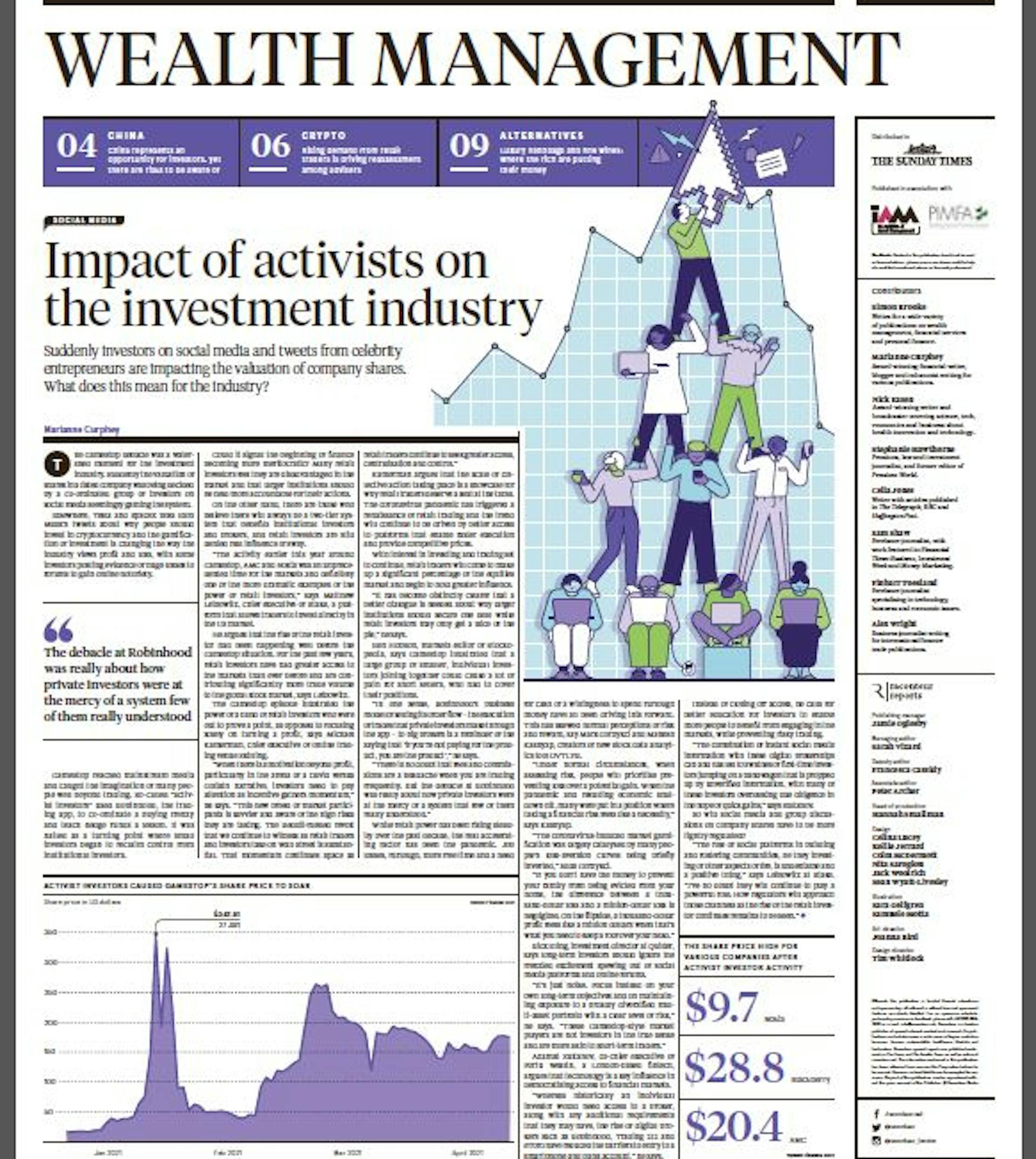

Chris IggoAXA IM Chief Investment Officer, Core Investments
September 17, 2021
Why Responsible Investing is Good for People and the Planet
5 minutes
Original Content: AXA IM
Investment managers are increasing their focus on environmental, social and governance (ESG) issues and playing a critical role in the transition to a low carbon future.
As the focus on environmental, social and governance standards becomes increasingly important for investors around the world, the case for sustainable investing has never been stronger. What once simply meant investing in entities that were sustainable over the long term and could grow their earnings has developed to encompass a much broader definition of sustainability in that business models must be able to continue without incurring disruptions from ESG issues, says Chris Iggo, chief investment officer at AXA Investment Managers.
A good example is a business that is a heavy carbon emitter—increasingly it will be penalised for those carbon emissions either through taxation or regulation to the point where it will become less profitable and therefore the business will be unsustainable,
he explained.
While there are a number of ESG risks that investors need to think about, it is also creating opportunities for investors to support companies that are contributing to a sustainable future.
An example would be a renewable energy company, which is helping shift the economy to a low carbon world,
said Iggo.
While some institutional investors such as endowment, charitable and pension funds have long incorporated non-financial considerations into their investment policies, responsible investing is now becoming far more mainstream.
There are two things driving this,
said Iggo. People do want to invest in assets that are good for people and the planet, but there is also a sense that the world is moving this way and therefore some companies are going to be rewarded for doing the right thing and there are other companies that are going to be punished for not doing the right thing, which will increase their cost of capital and make it harder to generate a good economic return.
While ESG concerns are wide-ranging, the issue that is drawing the most attention is climate change and the potential cost of not reducing carbon emissions. A number of countries have committed to achieve net-zero carbon emissions by 2050, and those government commitments mean they are likely to pressure businesses to reduce carbon emissions while implementing policies to transition to a low carbon economy.
Not only do governments have the power to impose regulations and taxes to help achieve that, they also have the fiscal power to subsidise new technologies and encourage the energy transition,
Iggo said. It’s also very measurable—we can look at a company and measure its carbon footprint today and we can assess how that’s going to look going forward based on the plans that company has to transform itself. The UK, the US and Chinese governments all have target dates where they want to achieve net zero economies, so there’s huge pressure on companies to be compliant towards those universal targets.
Against that backdrop, investment managers can also play a critical role in helping the world transition to a low carbon future. For starters, fund managers can measure the carbon intensity of their investment portfolios by measuring the carbon footprint of all the companies that particular fund invests in, allowing managers to adjust their portfolios’ carbon footprints accordingly.
For example, AXA Investment Managers has committed to exit all of it coal investments in OECD countries by the end of this decade and in the rest of the world by 2040.
That’s a big source of capital that coal companies can no longer tap, which means they can’t fund their businesses as easily as they did in the past, but equally asset managers can also play a more venture capital role by investing in companies that are developing new technologies such as electronic vehicle batteries,
Iggo said.
Investors also have a role to play in engaging with businesses and marshalling them in the right direction on sustainability issues, no matter if they are investing in equities or bonds. AXA Investment Managers’ stewardship and engagement strategy, for instance, seeks to protect client investments by holding businesses to account on issues that could significantly impact the value of that business—and therefore investor returns—over the longer term.
The growth in sustainable investment also means that asset managers have to weigh ESG considerations such as climate, inequality and biodiversity alongside more traditional investment metrics, such as a company’s financial statement and balance sheet.
Incorporating that information into the investment decision is already happening and it’s becoming embedded into the traditional investment process even for funds that don’t class themselves as ESG,
said Iggo. It’s a necessary process to go through to establish the value of a corporate asset, because if you ignore all that then suddenly that asset could get devalued through some kind of fine or increased tax burden or whatever it might be, and if you’re not aware of those risks through a detailed study of the business then as an investor you’re going to underperform.
Any concerns that investors might have that they are forfeiting potential returns in favour of more sustainable but less profitable investments is also being contradicted by an increasing body of research that shows that incorporation of ESG factors can lead to better investment performance.
That trade off just doesn’t exist,
said Iggo. Think about a sector such as the auto sector. Some car companies are much further advanced in developing new electronic vehicles for example, so you can still have the same allocation to autos but within that you can pick the best-in-class companies. They’re likely to be the ones that have done more in terms of changing their business model, and that means they’re more profitable and the return to investors will be better as a result.
AXA Investment Managers is already leading by example on sustainability. It has pledged to reduce its carbon exposure to net zero by 2030 across all of its investment portfolios. And 90% of its assets under management meet the criteria set out under articles 8 and 9 of the EU’s new sustainable finance disclosure regulation.1
Our culture has undergone a massive change to put sustainability at the heart of everything we do, from research to our entire investment process,
said Iggo. As a responsible asset manager, we actively invest for the long term—to help our clients prosper and to secure a thriving future for people and the planet.

Download the report
DownloadSources
[1] As at 31 December 2020, assets under management within Equities, Fixed Income and Multi-Asset stand at €587 billion out of which €460 billion are applicable under the SFDR.
Disclaimer
This document is for informational purposes only and does not constitute investment research or financial analysis relating to transactions in financial instruments as per MIF Directive (2014/65/EU), nor does it constitute on the part of AXA Investment Managers or its affiliated companies an offer to buy or sell any investments, products or services, and should not be considered as solicitation or investment, legal or tax advice, a recommendation for an investment strategy or a personalized recommendation to buy or sell securities. It has been established on the basis of data, projections, forecasts, anticipations and hypothesis which are subjective. Its analysis and conclusions are the expression of an opinion, based on available data at a specific date. All information in this document is established on data made public by official providers of economic and market statistics. AXA Investment Managers disclaims any and all liability relating to a decision based on or for reliance on this document. All exhibits included in this document, unless stated otherwise, are as of the publication date of this document. Furthermore, due to the subjective nature of these opinions and analysis, these data, projections, forecasts, anticipations, hypothesis, etc. are not necessary used or followed by AXA IM’s portfolio management teams or its affiliates, who may act based on their own opinions. Any reproduction of this information, in whole or in part is, unless otherwise authorised by AXA IM, prohibited.



